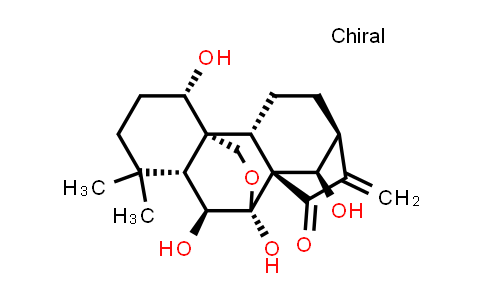
Oridonin NLT 98%
SKU : MC546611
CAS Number : 28957-04-2
Molecular Formula : C20H28O6 | Molecular Weight : 364.43
Synonyms : NSC-250682; Isodonol
Quote Request| Purity | NLT 98% |
|---|---|
| Storage | at 20ºC 2 years |
* The above information is for reference only.
* If the product has intellectual property rights, a license granted is must or contact us.
| Chemical Name | Oridonin |
|---|---|
| CAS Number | 28957-04-2 |
| MDL Number | MFCD00221762 |
| Molecular Formula | C20H28O6 |
| Molecular Weight | 364.43 |
| Synonyms | NSC-250682; Isodonol |
Oridonin (NSC-250682), a diterpenoid isolated from Rabdosia rubescens, acts as an inhibitor of AKT, with IC50s of 8.4 and 8.9 μM for AKT1 and AKT2; Oridonin possesses anti-tumor, anti-bacterial and anti-inflammatory effects. IC50 & Target: IC50: 8.4 μM (AKT1), 8.9 μM (AKT2)[1] In Vitro: Oridonin is an ATP-competitive inhibitor of AKT with IC50s of 8.4 and 8.9 μM for AKT1 and AKT2, respectively. Oridonin (5, 10 or 20 μM) obviously inhibits the growth of KYSE70, KYSE410 and KYSE450 ESCC cells via targeting AKT1/2. Oridonin (10 or 20 μM) causes G2/M phase cell cycle arrest in KYSE70, KYSE410 and KYSE450 cells, and induces apoptosis in these three cell lines at 20 μM. In addition, Oridonin (5, 10 or 20 μM) in combination with cisplatin or 5-FU enhances the inhibition of esophageal squamous cell carcinoma (ESCC) cell growth[1]. Oridonin (0.1 and 1 μM) preferentially suppresses AKT/mTOR signaling. Oridonin (1 μM) also selectively suppresses growth of breast cancer cells with hyperactivation of AKT signaling[2]. In Vivo: Oridonin (160 mg/kg, p.o.) shows significant reduction in the tumor growth without obvious weigh loss in SCID mice bearing EG9 and HEG18 tumor cells. Oridonin treatment also suppresses the expression of Ki-67, phosphorylated AKT, GSK-3β or mTOR in mice[1]. Oridonin (15 mg/kg, i.p.) impairs cell growth in breast cancer with hyperactivation of AKT signaling in nude mice[2].
Related Products
© Copyright 2015-2024 Hangzhou MolCore BioPharmatech Co.,Ltd. All rights reserved.
